"Huang Zhenyi": the joys and sorrows of Jie Yuhua's life
The blue water in the green hills, Moquayi removed it, and once it reached the sea, it would not return.
The bright moon is full of empty mountains, why should we take a break and go?
- Huang Zhenyi
There are very few movies and TV dramas with geisha as the protagonists. Prostitutes will be morally criticized in any culture and will not be tolerated by mainstream etiquette.
But in the feudal society, the class hierarchy was strict, and the patriarchal etiquette was so strict that it was unreasonable, but no matter what culture, there would be shadows of these low-status people. Many daughters of famous families can only leave a ranking with their husband's surname in history, but there are many prostitutes who have left romantic affairs, even their own names and works.
The guests of princes and nobles, and the confidantes of literati and poets. Without the shackles of etiquette, the evil side of human nature will be displayed wantonly, and it will bring out the true love and righteousness more and more. A prostitute is a mirror, which can reflect an era and prosperity and turmoil, as well as the darkness and frankness of human nature.
The creators are very willing to use prostitutes as the protagonists. Their lives are full of facets and tensions. They can be steadfast or unrestrained, ruthless or affectionate; miserable. This huge contrast is very precious, so no matter what era and cultural background, the story of Fireworks and Liuxiang can be talked about with relish.
In the past, the famous courtesans were both talented and beautiful, and most of them were female artists who could match the literati. Hwang Jin-yi is the first geisha in North Korean history, and her stage name is Mingyue. Coincidentally, she and the imperial physician Dae Jang Geum belonged to the same era. This era is also unique. Three women who have played an important role in Korean history can be born at the same time: Dae Jang Geum, Empress Munjeong, and Hwang Jinyi.
The TV series is an old drama from 2006. I watched it when I was a child but understood it too shallowly. At that time, how could I really understand works with strong human contrasts?
"Huang Zhenyi" touched me too much.
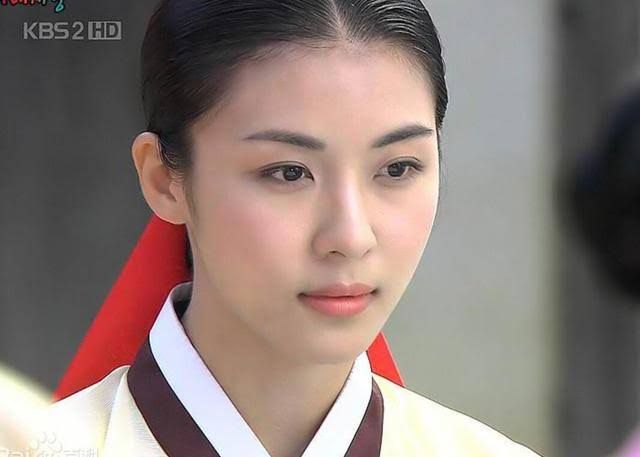
1
I was particularly moved by the portrayal of the relationship between geisha in the play.
The women in "Huang Zhenyi" are not only kind and pure. There is no such option in the world of the humble and cruel prostitute.
They are ruthless, flamboyant, utilitarian, jealous, resentful, and have "evil" in their bodies. They are passionate about money and obsessed with power; their ambition is engraved in their bones, and their vanity is on their faces. But it is difficult for people to judge their evil, because they still have compassion, magnanimity, heart, courage and responsibility.
The top two, Xingshou Baiwu and Mei Xiang, are fellow disciples and sisters, their rivals and their only confidant in the world. When facing each other head-on, the two refused to give in to each other, and they couldn't let each other take advantage of each other. But behind the scenes, he gave the other party a very high evaluation. Mei Xiang said that he and his disciples could not dance the crane dance for a lifetime as well as Bai Wu, Bai Wu said that Mei Xiang's sword dance is unmatched and the best in the world.
The one who hated Bai Wuren the most was Mei Xiang. But Bai Wu had an accident. It was Mei Xiang who rushed from the capital to Song Song overnight. It was Mei Xiang who dared to scold the scholar-officials who loved Bai Wu.
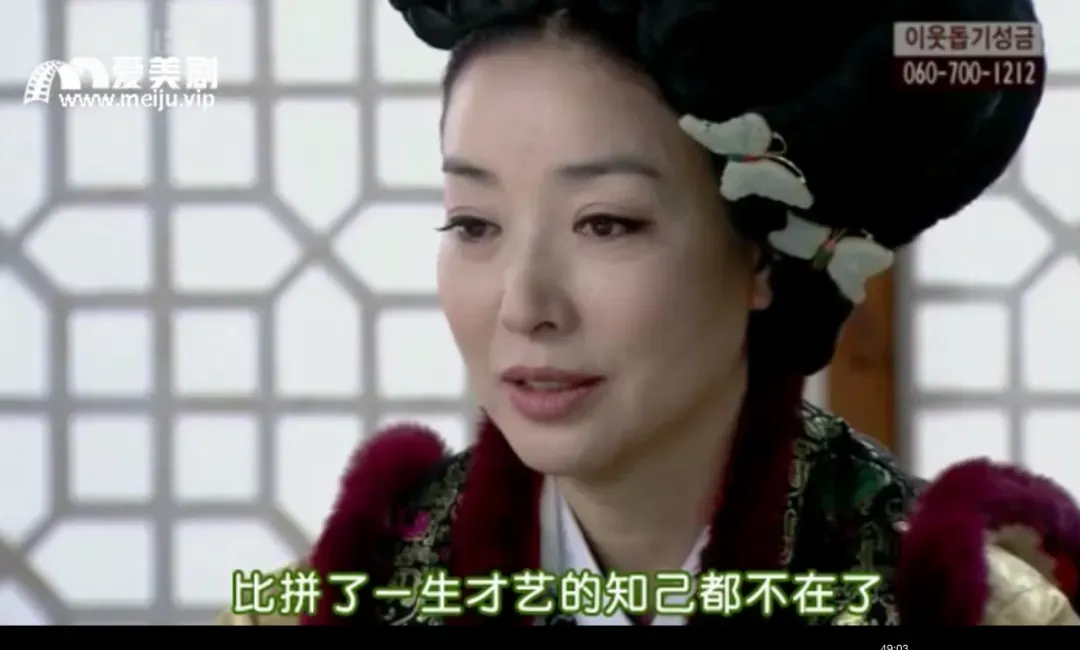
As Mei Xiang's proud disciple, Furong is amazingly talented and skilled, but everything falls behind Zhen Yi. She is jealous and resentful, but Zhenyi really dances with a mortal heart, and she runs around begging the powerful to save her life. Jin Yi showed a talent above her head, and she was the first to recognize the applause. Years later, when my disciple asked her who Zhenyi was, she said that she was my only confidant and a rival.
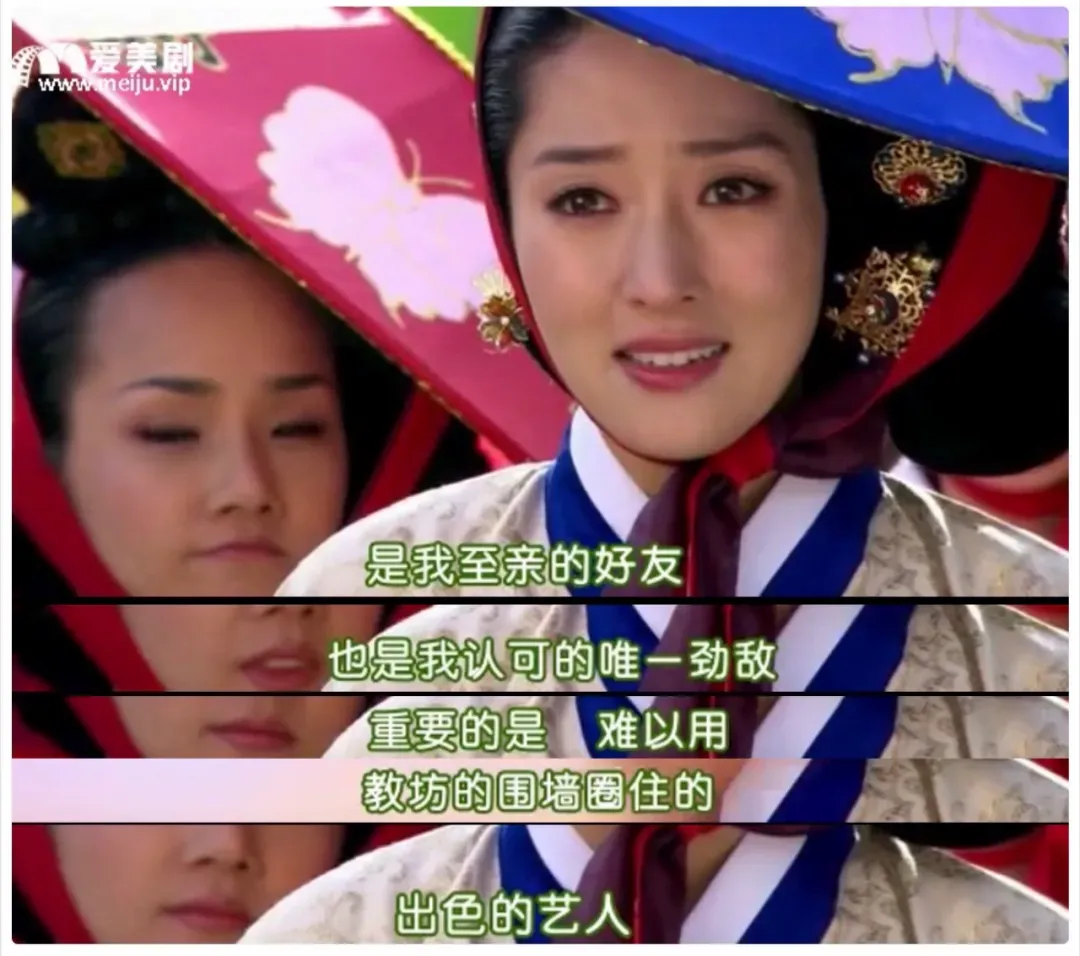
I especially like the sympathy between people and people. Only smart people can recognize smart people, and talented people can cherish real skills. The struggle between women and women is really not all about love. "Huang Zhenyi" is particularly good, and has never written such a vulgar plot from beginning to end.
2
The fact that they came from humble backgrounds is a fact that they cannot change, but the pursuit of excellence in craftsmanship and the recognition of their own personality are not limited by their identity. The powerful can decide their life and death, but it is impossible for them to submit.
One of the most common words Bai Wu said to his disciples was: Remember that you are geishas, not prostitutes who sell laughter, but entertainers who rely on their talents to impress people and represent the highest level of dance in North Korea.
Geisha and entertainer are the same word, but they are separated by a huge gap.
Bai Wu and Mei Xiang tried their best to fail to cross this gap. But Zhenyi did it.
Bai Wu knows Zhen Yi better than Zhen Yi's mother Xuan Jin. She said that Zhenyi might not live without love, but it is absolutely impossible for her to live without dancing.
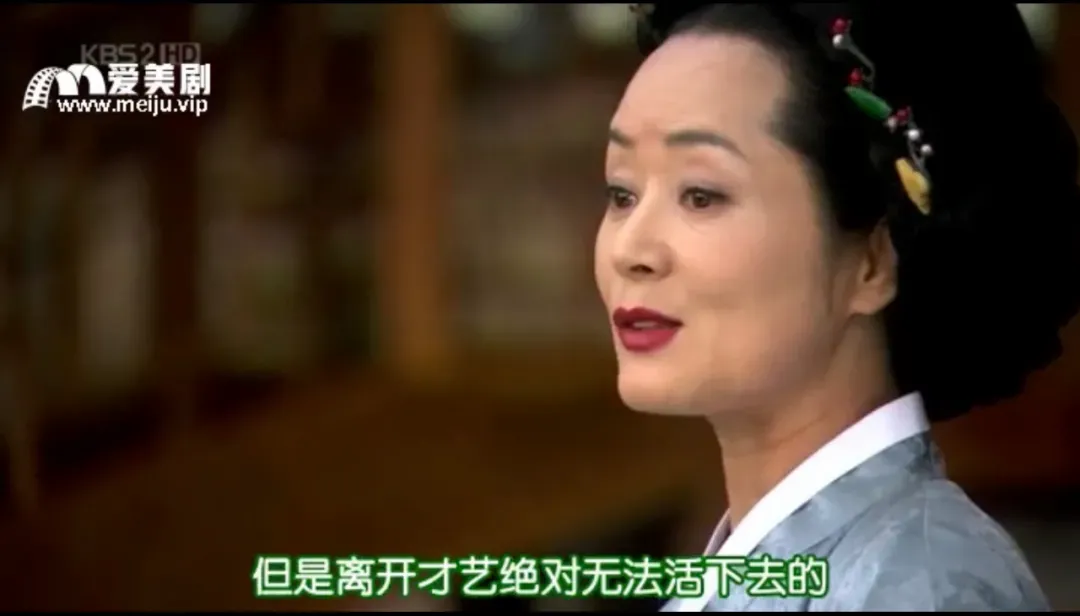
Bai Wu saw it clearly the first time she saw Zhen Yi. At that time, Zhenyi was wearing a monk's robe and immersed in the dance happily and enthusiastically. You can jump out completely just by looking at it once from a distance, and you can understand its sad shape and meaning only from the dance. This is Jin Yi, Jin Yi who is destined to become an entertainer.
To be an artist, one must go through hardships. The most important thing for a geisha is not alcohol, not love, not talent, but pain.
Accompanying pain, and overcoming pain, it is possible to achieve a breakthrough in technology. The three most moving dances in the entire show are accompanied by great pain. The crane dance before Bai Wu's death, the Chengcai dance who Zhenyi bids farewell to her teacher, and the dance who vows to go to Huangquan with her lover.
The emotions in my heart overwhelmed the intention of simply presenting the dance, and instead of caring about the movements and techniques of the dance. Unconscious, unintentional, and the dance infused with sincerity is the dance of the soul.
I really, really like Crane Mai, who is on the verge of Bai Wu's death, and Cheng Caiwu, who sees Zhen Yi bid farewell to her mentor. This episode is very poignant. It's my favorite and most impressive scene in the whole show.
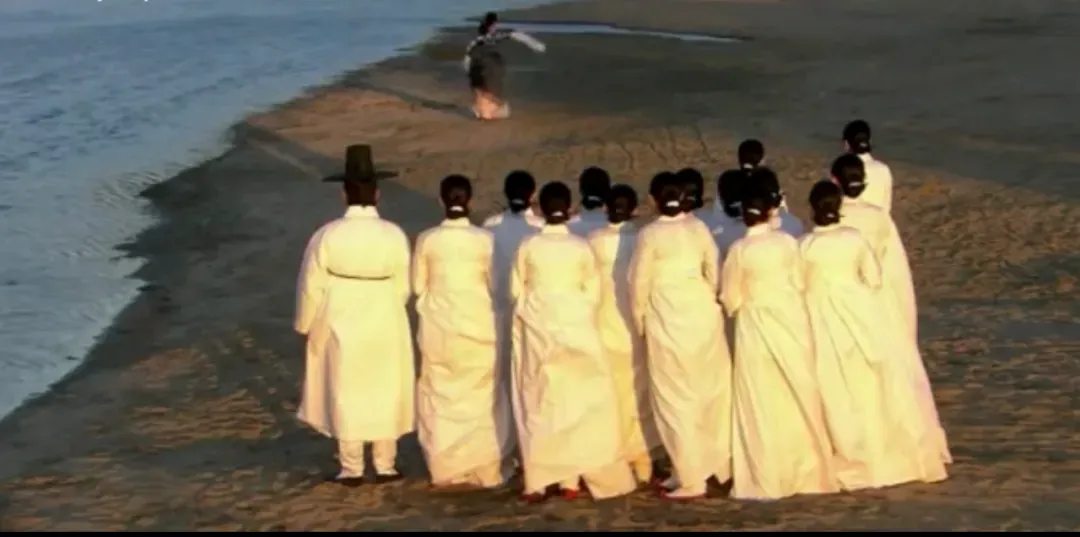
Bai Wu overturned the wine table of the prince who insulted the talent of the geisha at the banquet, and was sentenced to death in prison. Escaped to the edge of a cliff the day before the execution. Dance another crane dance on the edge of the cliff, and then go back alone like a crane, fulfilling your dignity and talent.
She said that the crane dance is a dance in which the white crane wants to spread its wings and fly high, but cannot give up the attachment to the land, so it rises and falls and wanders. Full of contradictions and hesitations, it is the beauty and soul of Crane Dance. Only the heaven, earth and mountains and rivers witness the dying dance of Baiwu, and the world has no chance to see it.
Bai Wu's ashes were sprinkled in the river water. She hoped that after she died, she would turn into river water, and continue to dance with the waves.
The geishas in the workshop were wearing plain faces and white clothes to say goodbye to Baiwu, but only Zhenyihua dressed in bright make-up and danced by the riverside where the ashes of the master were sprinkled. Its dance name is Chengcai, which has the meaning of falling flowers and flowing water ruthlessly. It is a sad dance.
Zhenyi gritted her teeth and danced, enduring the pain. At this time, she knew the painstaking efforts of her master. The teacher's teachings echoed in her ears, vividly remembering the day she stepped into the classroom.
"Crossing this hurdle, you are on the road to becoming an artist"
"Be hard-hearted and jump until you can smile and watch the pain"
"- What is the most important thing for a geisha?
- Is it wine, love, talent?
- No, it's pain. "
This scene is so moving that I cry every time I watch it. Like the blank space of literature, the artistic conception is endless.
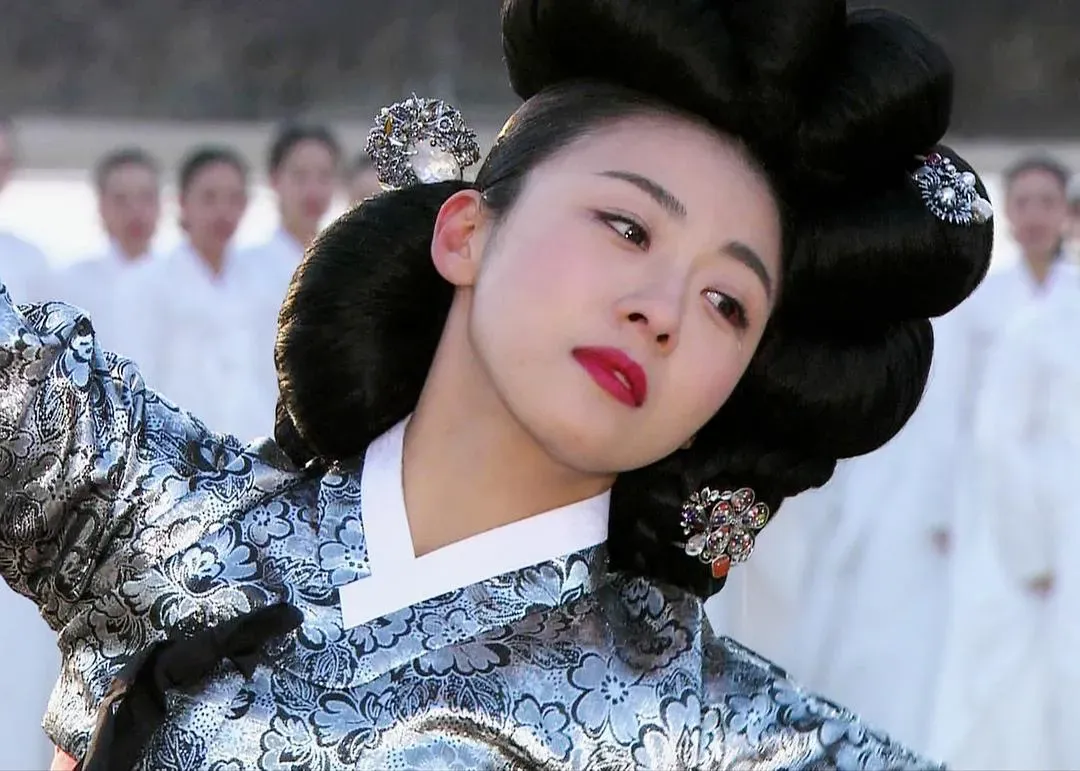
sharp contrast,
The plain clothes of the geishas, and the bright and beautiful true Yi.
The disciples wept bitterly, while the rivals and confidants wept silently.
The howling wind, the cold and dark cliffs, the rushing river, a beautiful woman dancing by the river. The surroundings were dark and cold, but she was as red as fire, out of place.
The background music is a melodious and sad melody, without a single line, but the screen is full of sadness and grief.
3
Zhenyi has to benefit from the guidance of Mr. Hongru Huatan to become a real artist.
She was already the No. 1 geisha in North Korea at that time, but she felt that no one could hear the wrong sound she played, and she was just blindly praised. So she decided to wear a mask and go to the market to dance to find the truth. Unexpectedly, no one stopped at all when she danced seriously.
Mr. Huatan said that her dance was full of arrogance, and even the act of coming to the market was arrogant. It is a matter of course that he is the best dancer in the world to impress people.
I really like the idea of this episode.
In reality, there are too many people's words, words, and skills that are full of arrogance. Deliberately creating a threshold for appreciation and understanding, it seems that the taste is good, but in fact it is just showing its superiority. Because of his ability and talent, he deserves to be recognized and respected. This kind of mentality has made him lose his reverence for talent, and he is getting farther and farther from the right path.
"Huang Zhenyi" finally wants to express that she is not dressed in sackcloth, with no music and no dance notes, defeating Furong who is dressed in fancy clothes and dances a difficult dance, in order to prove that simplicity is more noble than exquisite craftsmanship.
Mayi jumped out of the walls of the church, no longer carried the arrogance of the world's largest maiko, nor the low self-esteem of a geisha. Very peaceful, dancing in awe of art. It really realized that the skills that my teacher Baiwu said did not distinguish between high and low, and like my stage name Mingyue, it shone brightly to the crowd in all directions, and became a real artist.
The ultimate skill of any skill only stays at the level of "skill". Obscure words do not mean high literary literacy, and piled up words do not mean excellent writing. Deliberate display of skills may be gorgeous, but it is sincerity that impresses people after all.
But skills are also very important. If the "art" part is not perfect, it is not qualified to talk about "Tao". When the masters discuss the sword, the one who is closest to the state of "no-self" will win. What Furong loses is not skill, but the awe of talent.
4
The saddest part of "Huang Zhenyi" is love. The love that appears in the whole play, whether it is mutual affection or unilateral love, is a tragic ending.
Love is the poison of geisha. Not only "Huang Zhenyi", all the literary works I have read with prostitutes as the protagonists have expressed that the identity of a prostitute can be rich and powerful, but the only thing that cannot be touched is love.
Zhenyi's mother, Xuanjin, moved her heart, she was abandoned and cried blindly.
The musicians have silently adored Xuanjin for decades, in exchange for an appointment in the next life.
Bai Wu and Lord Tiao adore each other, but they can only look at each other from a distance.
The tragic love of Xianxian was buried with her life before it even started.
Dan Xin humbly loves Bi Xi Shou who is different from his own identity.
There are also two tragic love tragedies of Zhen Yi.
And Mei Xiang has no one to admire, and Furong can cut off her love very simply, and truly follow the geisha's warning not to move her heart. Always rational and calm, power and wealth are put first, and their mentor and apprentice are indeed the most suitable geisha for female music. Although the selection standard for female musicians is the most talented geisha, but the master and apprentice Baiwu Zhenyi, who is slightly more skilled, did not take this position.
The obstacle to the love of a geisha is the secular etiquette. Both of Zhenyi's loves died here. Her first love touched a lot of people, but I don't think it's as moving as the second paragraph.
Bai Wu personally pushed Zhen Yi's first love to a dilemma. Eun-ho has to choose between resisting the laws of the patriarchal state or giving up on Jin-yi. The result was not what she expected. Although Eun Ho was determined, he still flinched in the face of the pressure. Xuan Jin said that he was fighting against his father, so he couldn't draw a sword. But Bai Wu scolded Xuan Jin for pushing Zhen Yi to a falsehood, and that love that changed more than a thunderstorm day was not worth all that Zhen Yi risked to pursue.

Baiwu is right.
Not on purpose to put them in a corner. But the obstacle that Jin Yi has to face is the law of the country, and what Eun Ho has to fight is the patriarchy. If they don't really try it, how will they choose when they really face obstacles in the future? How to bear the consequences after choosing? Compromise this time, so will the next time.
But if a noble child admits a mistake, he can be forgiven by the world immediately, and he can also go into officialdom and marry a wife. But Zhen Yi is different. She will be suppressed and judged, and she will be reduced to the lowest slave servant from now on, and she will never be turned over.
Youth may be beautiful and bloody, and love may be sincere and passionate. But the depths and the roughness of the world are only truly diagnosed by people like Bai Wu who have spent half their life fighting in the wind and moon situations and seeing all the world's attitudes.
It's not that she doesn't believe in love. If Eun Ho can withstand the pressure of etiquette, there is nothing wrong with fulfilling a steadfast and beautiful love for this. But if it wasn't so steadfast, her beloved disciple would really be finished.
Jin Yi's second love started when she was full of resentment.
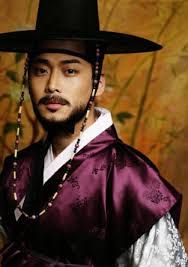
After the death of her first love, she was devastated, full of anger, playing with the powerful and challenging her teacher. She hated the theory of birth, the hypocritical scholar-bureaucrat, and the heartless master. The appearance of Kim Jong-han gave Jin-yi an opportunity to dispel her inner resentment. But in the end, the two of them were unable to resist the ravages of fate, and when pursuit and love conflicted, this time it was Zhen Yi who broke off her love with her own hands.
Kim Jong-han said that if Jin-yi was a man, then they would be best friends. Jin Yi said that if she was from a noble family, then she would really be able to marry him.
Although this is not their goodbye, I feel very sad. The depiction of love in Kaoyana's work is moving and detached from reality. The reality is that people of two classes cannot enter into marriage, but those who stick to love are not pedantic and stubborn. What they see is always the sincere heart and soul behind worldly standards. Reality cannot be changed, but people can get rid of the shackles of reality.
The two people in "Huang Zhenyi", one is a rare pillar of the court, and the other is a geisha whose life is art. It's not that they can't throw everything away, but once they are thrown away, their talents will be buried and their ideals will come to nothing. If they are tired of the life in the courthouse and the classroom, all they want is a peaceful corner, three meals a day, day and night. Recluse is the best choice, truly detached from reality. Too bad they aren't like that.
What is particularly touching is that Jin Yi is willing to sacrifice himself to fulfill Kim Jong Han's future. And Jin Zhenghan is also willing to be a pariah, fulfilling Zhenyi's talents, and staying by her side. The tragedy is that these two people can see the reality clearly, and they can detach from it, but they finally chose to say goodbye.
Saying goodbye to her beloved will be the pain that Zhen Yi can't get rid of any longer. I remembered Bai Wu again and said:
——Put love in the bottom of your heart and jump until you can smile and watch the pain.
——The most important thing for a geisha is not alcohol, talent and love, but pain.
Although the play uses a very strong brush to describe each love, it is not a work that focuses on love as a whole. The story that depicts Fengyue, but has nothing to do with Fengyue, is very structured and particularly meaningful. They are beautiful and beautiful, only I can't forget them.
end
"Huang Zhenyi" emphasizes "a humble person but a noble soul" and "only the sincerity can move the sincerity". The TV series is very good, only 24 episodes, but the rhythm is lively and the characters are fresh and full.
In the context of feudal society, there is no more curious rumor than the romantic past of Fireworks and Liuxiang, and there is no more complex and multifaceted female story than the life of a prostitute.
The demeanor of the real Huang Zhenyi in history should be more gorgeous than the TV series.
Compared with the half-coaxing and half-leading in the TV series, the real Huang Zhenyi was born in a noble family, but volunteered to be a prostitute. In ancient times, North Korea's identity was hereditary from her mother rather than her father. Huang Zhenyi's mother was the concubine of a scholar-officer, so even if she was born in Gaomen, she was a pariah.
She should see through the hypocrisy and ugliness of the powerful class more, and hate the pedantic and narrow origin theory. To be able to leave poems and scores, real names and stage names, and interesting stories mocking princes and nobles in the strict feudal era, is already very remarkable.
Her own rebellious and independent, romantic and poetic personality can be seen in her last words:
"I liked liveliness during my lifetime, but didn't like loneliness, so bury me on the side of the road where there are many pedestrians. Also, I like the rhythm most in my life, so when I am buried after my death, don't play sad music.
Like my work? Don't forget to support and clap, let me know that you are with me on the road of creation. Keep this enthusiasm together!
